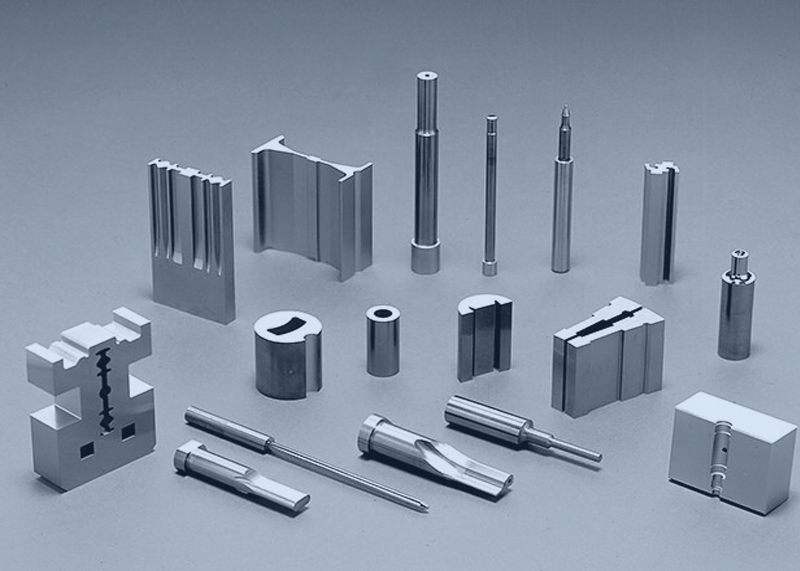What is Carbide Punches?
Carbide punches are specialized tools used in various manufacturing processes to create holes, indentations, or other forms in materials such as metals, plastics, and ceramics. These punches are made from carbide, a compound composed of carbon and one or more metallic elements, typically tungsten, titanium, or tantalum. Carbide is chosen for its exceptional hardness, wear resistance, and thermal stability, making it an ideal material for applications that involve high-pressure punching or forming operations. Carbide punches are commonly used in industries such as automotive, aerospace, electronics, and metalworking, where precision and durability are essential. These punches are designed to exert high forces on the workpiece, allowing for precise and efficient punching operations. The hardness of carbide ensures that the punch maintains its shape and cutting edge integrity even when used on tough or abrasive materials.

One of the key advantages of carbide punches is their superior hardness compared to traditional punch materials such as steel or tool steel. Carbide punches can withstand the high pressures and forces encountered during punching operations without deforming or wearing out quickly. This extended wear resistance results in longer tool life and reduced downtime for maintenance or replacement, leading to increased productivity and cost savings for manufacturers. Carbide punches exhibit excellent thermal stability, allowing them to withstand the high temperatures generated during punching operations without losing their hardness or mechanical properties. This thermal resistance is particularly beneficial in applications such as hot punching or piercing, where punches are subjected to intense heat and pressure. Carbide punches retain their cutting edge sharpness and dimensional accuracy even under extreme temperature conditions, ensuring consistent performance and reliability.
Carbide punches can be manufactured with intricate geometries and tight tolerances, allowing for the creation of precise holes, indentations, or forms in the workpiece. Manufacturers can customize carbide punches to meet the specific requirements of different applications, including specialized coatings or surface treatments to further enhance wear resistance and performance. With their precision engineering and versatility, carbide punches enable manufacturers to achieve high-quality results in punching operations across a wide range of materials and industries. Carbide punches are essential tools in manufacturing processes for creating holes, indentations, or other forms in materials. With their exceptional hardness, wear resistance, thermal stability, precision engineering, and versatility, carbide punches offer numerous advantages over traditional punch materials. By optimizing punching operations, these punches contribute to increased productivity, reduced costs, and improved product quality in manufacturing environments.
Features and Benefits of Carbide Punches
Carbide punches manufacturer, India offer a plethora of features and benefits that make them indispensable tools in various manufacturing processes. Here's a detailed exploration of their key attributes:
Exceptional Hardness:
Carbide punches are renowned for their extraordinary hardness, which surpasses that of conventional punch materials like steel or tool steel. This exceptional hardness enables carbide punches to withstand high-pressure punching operations without succumbing to deformation or wear. As a result, carbide punches maintain their sharp cutting edges and dimensional accuracy over prolonged periods, ensuring consistent and precise punching performance.
Superior Wear Resistance:
The inherent hardness of carbide translates into superior wear resistance, making carbide punches highly durable tools for demanding manufacturing environments. These punches can withstand abrasive wear and maintain their cutting edges even when used on tough or abrasive materials. With their extended tool life and reduced susceptibility to wear, carbide punches offer long-term cost savings by minimizing downtime for maintenance or replacement.
Thermal Stability:
Carbide punches exhibit excellent thermal stability, enabling them to withstand high temperatures encountered during punching operations without compromising their mechanical properties. This thermal resistance is particularly advantageous in applications involving hot punching or piercing, where punches are subjected to elevated temperatures. Carbide punches retain their hardness and cutting edge integrity even under extreme temperature conditions, ensuring consistent and reliable performance.
Precision Engineering:
Carbide punches are precision-engineered to achieve tight tolerances and intricate geometries, allowing for the creation of precise holes, indentations, or forms in the workpiece. Manufacturers can customize carbide punches to meet the specific requirements of different applications, ensuring optimal performance and compatibility with various materials and punching processes.
Versatility:
Carbide punches find applications across a wide range of industries and materials, including metals, plastics, ceramics, and composites. Their versatility makes them suitable for punching operations in automotive, aerospace, electronics, and general manufacturing sectors. Carbide punches can be tailored to accommodate different punching tasks, from simple hole punching to complex forming operations, making them indispensable tools in modern manufacturing processes.
Cost-effectiveness:
Despite their higher initial cost compared to traditional punch materials, carbide punches offer significant cost savings over time due to their extended tool life and reduced downtime for maintenance or replacement. The durability and wear resistance of carbide punches contribute to lower overall operating costs by minimizing tool-related expenses and maximizing productivity in manufacturing operations.
Carbide punches stand out for their exceptional hardness, wear resistance, thermal stability, precision engineering, versatility, and cost-effectiveness. These features make carbide punches preferred tools for achieving precise and efficient punching operations across diverse industries and materials. By offering consistent performance, extended tool life, and reduced operational costs, carbide punches play a crucial role in enhancing productivity and quality in modern manufacturing environments.
